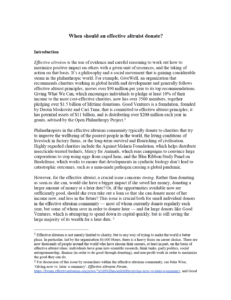When should an effective altruist donate?
William MacAskill (Global Priorities Institute, Oxford University)
GPI Working Paper No. 8-2019, published as a chapter in Giving in Time
Effective altruism is the use of evidence and careful reasoning to work out how to maximize positive impact on others with a given unit of resources, and the taking of action on that basis. It’s a philosophy and a social movement that is gaining considerable steam in the philanthropic world. For example, GiveWell, an organization that recommends charities working in global health and development and generally follows effective altruist principles, moves over $90 million per year to its top recommendations. Giving What We Can, which encourages individuals to pledge at least 10% of their income to the most cost-effective charities, now has over 3500 members, together pledging over $1.5 billion of lifetime donations. Good Ventures is a foundation, founded by Dustin Moskovitz and Cari Tuna, that is committed to effective altruist principles; it has potential assets of $11 billion, and is distributing over $200 million each year in grants, advised by the Open Philanthropy Project. [...]
Other working papers
Against Anti-Fanaticism – Christian Tarsney (Population Wellbeing Initiative, University of Texas at Austin)
Should you be willing to forego any sure good for a tiny probability of a vastly greater good? Fanatics say you should, anti-fanatics say you should not. Anti-fanaticism has great intuitive appeal. But, I argue, these intuitions are untenable, because satisfying them in their full generality is incompatible with three very plausible principles: acyclicity, a minimal dominance principle, and the principle that any outcome can be made better or worse. This argument against anti-fanaticism can be…
Is Existential Risk Mitigation Uniquely Cost-Effective? Not in Standard Population Models – Gustav Alexandrie (Global Priorities Institute, University of Oxford) and Maya Eden (Brandeis University)
What socially beneficial causes should philanthropists prioritize if they give equal ethical weight to the welfare of current and future generations? Many have argued that, because human extinction would result in a permanent loss of all future generations, extinction risk mitigation should be the top priority given this impartial stance. Using standard models of population dynamics, we challenge this conclusion. We first introduce a theoretical framework for quantifying undiscounted cost-effectiveness over…
The paralysis argument – William MacAskill, Andreas Mogensen (Global Priorities Institute, Oxford University)
Given plausible assumptions about the long-run impact of our everyday actions, we show that standard non-consequentialist constraints on doing harm entail that we should try to do as little as possible in our lives. We call this the Paralysis Argument. After laying out the argument, we consider and respond to…

